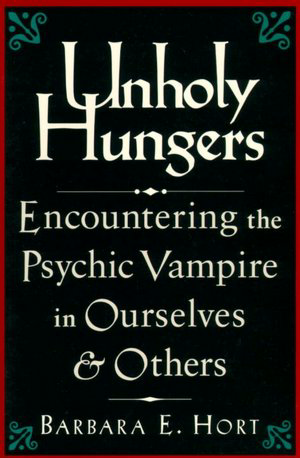Part of the Casswiki article series Books

Unholy Hungers: Encountering the Psychic Vampire in Ourselves & Others is a book by Jungian counselor Barbara E. Hort, published in 1996.
This book is the author’s interesting study on the dark psychological archetype of what we would know as a “Vampire”. In this study, she is looking at the psychic vampires, who are very much like everyone else as they are the people who thirst for power, robbing other individuals of their energies. The author’s work showed how easily we can be caught into the psychic vampire’s grasp, and this is important because it showed our weaknesses and strengths during our interactions with many people, especially disturbed individuals and psychopaths.
From Laura Knight-Jadczyk’s review on Amazon:
The only people who don’t like this book are the psychic vampires who prey on nurturing people. This book opened my eyes and set me free! I recommend it to everyone I know along with Martha Stout’s The Myth of Sanity, The Sociopath Next Door, Hare’s Without Conscience, Snakes in Suits, and Łobaczewski’s Political Ponerology. If you never read anything else in your life, read this short list of books for your own protection!
Having said that, let me mention the failings of the book. Like all Jungians, Hort believes that everyone has a soul and everyone can equally be a “vampire” so to say. Well, yes, a person who has been raised in a pathological environment - that is, “bitten by the vampire” - can certainly exhibit vampiric traits, but there IS a larger archetype that Hort - and other Jungians - miss completely: the Psychopath.
This book is a great example of an opportunity to say something that would really help society that was missed or ignored. Hort describes psychopathy perfectly (and pathological behavior among normal people who have been pathologized by the psychopathic norms of our society) and then semanticizes it.
Instead of really educating people about personality disorders and pathology, she suggests that everyone has the archetype of the vampire waiting in the shadows and we only need the right or wrong set of triggers to set it off. That’s Bozo Psychology 101!
While I really like some Jungian ideas, their refusal to come down to earth and call a spade a spade is unbelievably frustrating.
Nevertheless, we can use stories and archetypes to analyze what we experience and what we see in ourselves and others. For that reason, I highly recommend this book with the caveat that you keep in mind that what you are reading is a description of psychopathy and its effects on normal people and that the real vampire is the psychopath and he/she is born that way
